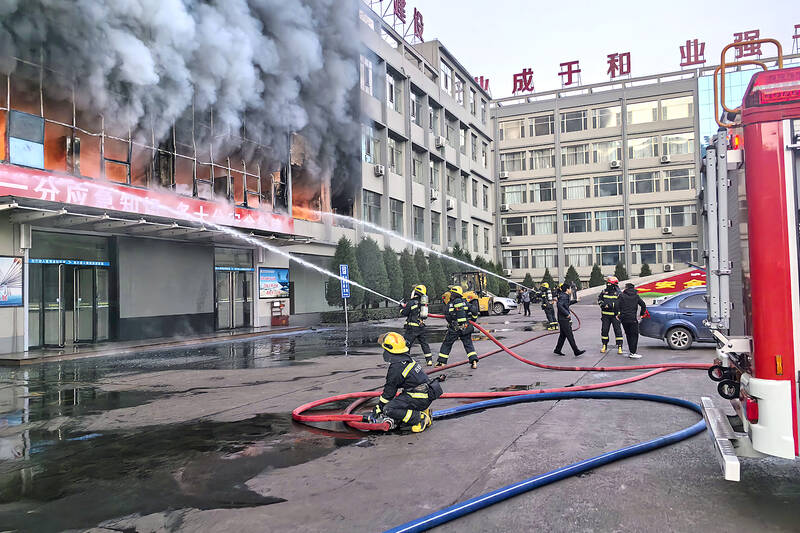Twenty-six people died and dozens were sent to hospital after a fire tore through a building in northern China’s Shanxi Province yesterday, Chinese state media reported.
The fire started at a four-story building belonging to the Yongju coal company in Luliang at about 6:50am, state media said, citing local authorities.
Twenty-six people were confirmed dead, Chinese state news agency Xinhua reported.

Photo: AP
Earlier, Chinese state-run China Central Television (CCTV) said that 63 people had been evacuated, and 51 of them were hospitalized.
The reports did not say if any of those taken to hospital had died.
“Rescue work is still in progress and the cause of the fire is under investigation,” CCTV reported.
A later update said the fire had “been brought under control.”
Video footage posted online showed bright flames and thick black smoke billowing from the building, while dozens of people stood in the parking lot watching.
The building shown in the video matched images of the coal company’s headquarters posted on its Web site.
Emergency response personnel could be seen in the footage racing to put on protective gear outside a fire truck parked at the building’s entrance.
Industrial accidents are common in China due to lax safety standards and poor enforcement.
In July, 11 people died after the roof of a school gym collapsed in the country’s northeast.
The month before, an explosion at a barbecue restaurant in northwestern China left 31 dead and prompted official pledges of a nationwide campaign to promote workplace safety.
In April, a hospital fire in Beijing killed 29 people and forced desperate survivors to jump out of windows to escape.
One of the worst such accidents took place in 2015 in Tianjin, where a gigantic explosion at a chemical warehouse killed at least 165 people.

ANGER: A video shared online showed residents in a neighborhood confronting the national security minister, attempting to drag her toward floodwaters Argentina’s port city of Bahia Blanca has been “destroyed” after being pummeled by a year’s worth of rain in a matter of hours, killing 13 and driving hundreds from their homes, authorities said on Saturday. Two young girls — reportedly aged four and one — were missing after possibly being swept away by floodwaters in the wake of Friday’s storm. The deluge left hospital rooms underwater, turned neighborhoods into islands and cut electricity to swaths of the city. Argentine Minister of National Security Patricia Bullrich said Bahia Blanca was “destroyed.” The death toll rose to 13 on Saturday, up from 10 on Friday, authorities

OPTIMISTIC: A Philippine Air Force spokeswoman said the military believed the crew were safe and were hopeful that they and the jet would be recovered A Philippine Air Force FA-50 jet and its two-person crew are missing after flying in support of ground forces fighting communist rebels in the southern Mindanao region, a military official said yesterday. Philippine Air Force spokeswoman Colonel Consuelo Castillo said the jet was flying “over land” on the way to its target area when it went missing during a “tactical night operation in support of our ground troops.” While she declined to provide mission specifics, Philippine Army spokesman Colonel Louie Dema-ala confirmed that the missing FA-50 was part of a squadron sent “to provide air support” to troops fighting communist rebels in

Two daughters of an Argentine mountaineer who died on an icy peak 40 years ago have retrieved his backpack from the spot — finding camera film inside that allowed them a glimpse of some of his final experiences. Guillermo Vieiro was 44 when he died in 1985 — as did his climbing partner — while descending Argentina’s Tupungato lava dome, one of the highest peaks in the Americas. Last year, his backpack was spotted on a slope by mountaineer Gabriela Cavallaro, who examined it and contacted Vieiro’s daughters Guadalupe, 40, and Azul, 44. Last month, the three set out with four other guides

Local officials from Russia’s ruling party have caused controversy by presenting mothers of soldiers killed in Ukraine with gifts of meat grinders, an appliance widely used to describe Russia’s brutal tactics on the front line. The United Russia party in the northern Murmansk region posted photographs on social media showing officials smiling as they visited bereaved mothers with gifts of flowers and boxed meat grinders for International Women’s Day on Saturday, which is widely celebrated in Russia. The post included a message thanking the “dear moms” for their “strength of spirit and the love you put into bringing up your sons.” It